
-
 US warplane went overboard into Red Sea: Navy
US warplane went overboard into Red Sea: Navy
-
'Like a dream' as IPL's 14-year-old Suryavanshi becomes youngest to hit T20 ton

-
 Luis Enrique says PSG have improved since October Arsenal loss
Luis Enrique says PSG have improved since October Arsenal loss
-
UN food, refugee agencies warn of huge cuts after funding losses

-
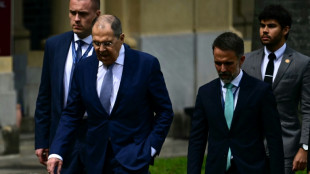 Trump trade war dominates BRICS meeting in Brazil
Trump trade war dominates BRICS meeting in Brazil
-
Rashford expected to miss rest of Aston Villa season

-
 IPL's 14-year-old Suryavanshi youngest to hit T20 ton as Rajasthan rule
IPL's 14-year-old Suryavanshi youngest to hit T20 ton as Rajasthan rule
-
Halle Berry, Jeremy Strong to join Cannes film festival jury: organisers

-
 Klopp congratulates Liverpool on Premier League triumph
Klopp congratulates Liverpool on Premier League triumph
-
Violence-weary Trinidadians vote in general election

-
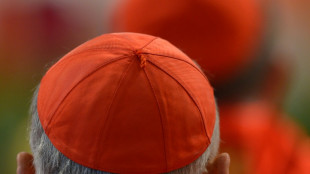 Abuse scandal in focus in search for new pope
Abuse scandal in focus in search for new pope
-
Prince William and Kate mark wedding anniversary in Scotland

-
 Amazon set for launch of Starlink-rival satellites
Amazon set for launch of Starlink-rival satellites
-
London mayor Sadiq Khan targets Olympic history for city

-
 Stock markets diverge amid trade hopes, ahead of earnings
Stock markets diverge amid trade hopes, ahead of earnings
-
Canada votes as Trump renews US takeover push
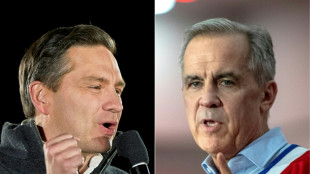
-
 Massive blackout hits all of Spain and Portugal
Massive blackout hits all of Spain and Portugal
-
Conclave starts May 7, cardinals say new pope must tackle abuse

-
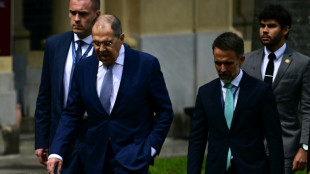 BRICS ministers meet in Brazil over Trump trade policies
BRICS ministers meet in Brazil over Trump trade policies
-
Trump escalates immigration crackdown to mark 100 days
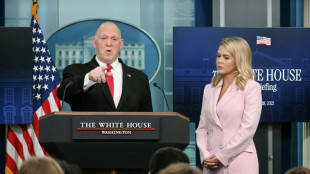
-
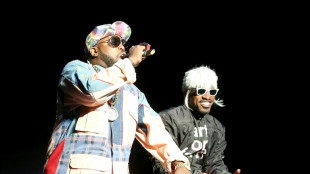 Outkast, White Stripes, Cyndi Lauper among Rock Hall inductees
Outkast, White Stripes, Cyndi Lauper among Rock Hall inductees
-
Putin orders three-day truce in May but Ukraine asks 'Why wait?'
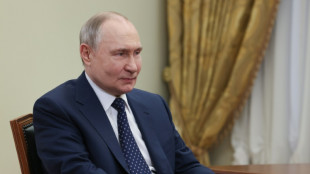
-
 Eubank Jr discharged from hospital following boxing grudge match
Eubank Jr discharged from hospital following boxing grudge match
-
China deploys army of fake NGOs at UN to intimidate critics: media probe
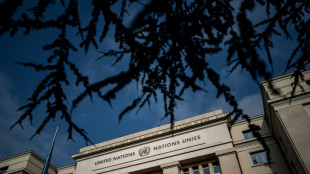
-
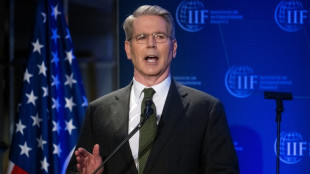 Empty shelves? US Treasury secretary not concerned 'at present'
Empty shelves? US Treasury secretary not concerned 'at present'
-
Slot told Liverpool they could win the league at season start: Konate

-
 Spain brought to a halt by huge blackout
Spain brought to a halt by huge blackout
-
Stock markets mostly higher amid trade talk hopes

-
 Conclave starts May 7, with cardinals saying new pope must tackle abuse
Conclave starts May 7, with cardinals saying new pope must tackle abuse
-
Massive blackout hits Spain and Portugal

-
 Ruediger 'must show respect to others' says Germany boss Voeller
Ruediger 'must show respect to others' says Germany boss Voeller
-
As Canada votes, Trump pushes US takeover plan
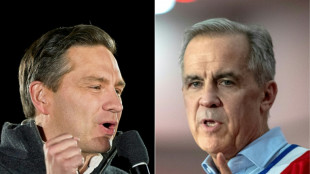
-
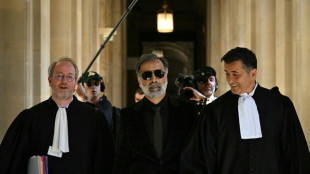 Ten on trial in Paris over 2016 gunpoint robbery of Kim Kardashian
Ten on trial in Paris over 2016 gunpoint robbery of Kim Kardashian
-
African players in Europe: Salah scores, takes selfies as Reds seal title

-
 Bangladesh spinner Taijul's 5 wickets trigger Zimbabwe collapse in 2nd Test
Bangladesh spinner Taijul's 5 wickets trigger Zimbabwe collapse in 2nd Test
-
French mosque murder suspect, 21, surrenders in Italy

-
 Mayor Khan keen for London to make Olympics history
Mayor Khan keen for London to make Olympics history
-
Iranian president visits Azerbaijan as ties warm
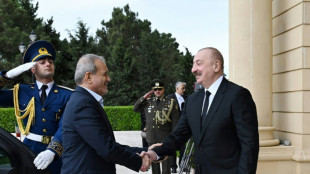
-
 What we know ahead of the conclave
What we know ahead of the conclave
-
Jannik Sinner launches foundation supporting children

-
 Villagers on India's border with Pakistan fear war
Villagers on India's border with Pakistan fear war
-
Putin announces surprise Ukraine truce for May 8-10

-
 Conclave to elect new pope starts May 7
Conclave to elect new pope starts May 7
-
Stock markets mostly rise amid trade talk hopes

-
 India says signs deal with France for 26 Rafale fighter jets
India says signs deal with France for 26 Rafale fighter jets
-
Trump's deep-sea mining order violates global norms: France
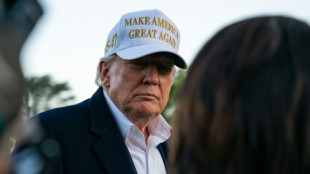
-
 India Kashmir crackdown sparks anger as Pakistan tensions escalate
India Kashmir crackdown sparks anger as Pakistan tensions escalate
-
Russia says claims over annexed Ukraine regions key to peace

-
 Austrian climber dies on Nepal mountain
Austrian climber dies on Nepal mountain
-
Fires rage 2 days after Iran port blast killed 46


Brazil seeks to curb AI deepfakes as key elections loom
AI-generated videos and photos used for political disinformation are the scourge of a busy global election year, and Brazil is scrambling to regulate the technology ahead of municipal polls.
In a country of 203 million, which counts more phones than people, Brazilian authorities last week banned the use of deepfake technology and set out guidelines for uses of AI for electoral purposes.
"Video montages can be used to manipulate public opinion, to defame individuals, or to interfere in the democratic process," Ana Carolina da Hora, a computer specialist at the PUC Catholic University in Rio de Janeiro, told AFP.
The rapid development of AI, turbocharged by the 2022 launch of ChatGPT, has shaken up the online landscape while sparking awe and fear over the future of the technology.
In a video circulating on social media in Brazil, the country's biggest pop star Anitta and football icon Neymar promote an online gambling scheme, or rather, ultra-realistic deepfakes of the celebrities do.
But in a country hard hit by political disinformation, authorities are particularly alarmed by cases like that of a mayor whose voice was cloned to create an audio file shared on social media in which he insults teachers in his municipality.
Similar cases are being investigated in two other states.
- 'Most modern standards' -
The Superior Electoral Tribunal (TSE) has decided to act. Last week, the use of deepfake technology was formally banned in the October municipal electoral campaign.
Any other type of use of artificial intelligence for electoral purposes must be accompanied by a notice clearly identifiable to the public.
Candidates caught using deepfake technology in the campaign could be blocked from running or have their mandates rescinded if elected.
TSE president Alexandre de Moraes said these were some of "the most modern standards in the world in relation to combating disinformation, fake news and the illicit use of artificial intelligence."
He warned that deepfake technology could "change the result of the elections."
In Brazil, former president Jair Bolsonaro was banned from holding office until 2030 for abuse of power and misuse of the media after he claimed, without evidence, that the Brazilian electoral system was not secure.
"The fact is that humanity is becoming a victim of algorithms... and being manipulated by artificial intelligence, in a way that has never been seen in history," President Luiz Inacio Lula da Silva said last week in an interview with the RedeTV channel.
Lula beat Bolsonaro by a razor-thin margin in 2022 elections that bitterly divided the nation, and the October municipal elections will be a crucial litmus test of his popularity.
- 'No single solution' -
Deepfake technology is also alarming experts in the United States, where opponents of President Joe Biden recently released an AI-generated call using what sounded like his voice, urging people not to cast ballots in a primary.
The nonprofit Center for Countering Digital Hate (CCDH) on Wednesday warned that several generative AI tools continue to allow the creation of deceptive images related to political candidates and voting.
Twenty digital giants, including Meta, Microsoft, Google, OpenAI, TikTok and X, last month joined together in a pledge to fight AI content designed to mislead voters.
They promised to use technologies to counter potentially harmful AI content, such as watermarks invisible to the human eye but detectable by machine.
In Brazil, Congress has waded into the debate, and Senate President Rodrigo Pacheco introduced a bill on the regulation of the use of artificial intelligence in all aspects of life which he hopes will be approved in April.
There is "no single solution to regulate artificial intelligence," said Bruno Bioni, director of Data Privacy Brazil, a data protection and digital rights organization, who stressed that AI affects sectors ranging from telecommunications to health.
He also highlighted the risk of discrimination linked to AI facial recognition in a country where more than half of the population is black or mixed race.
F.Schneider--AMWN


